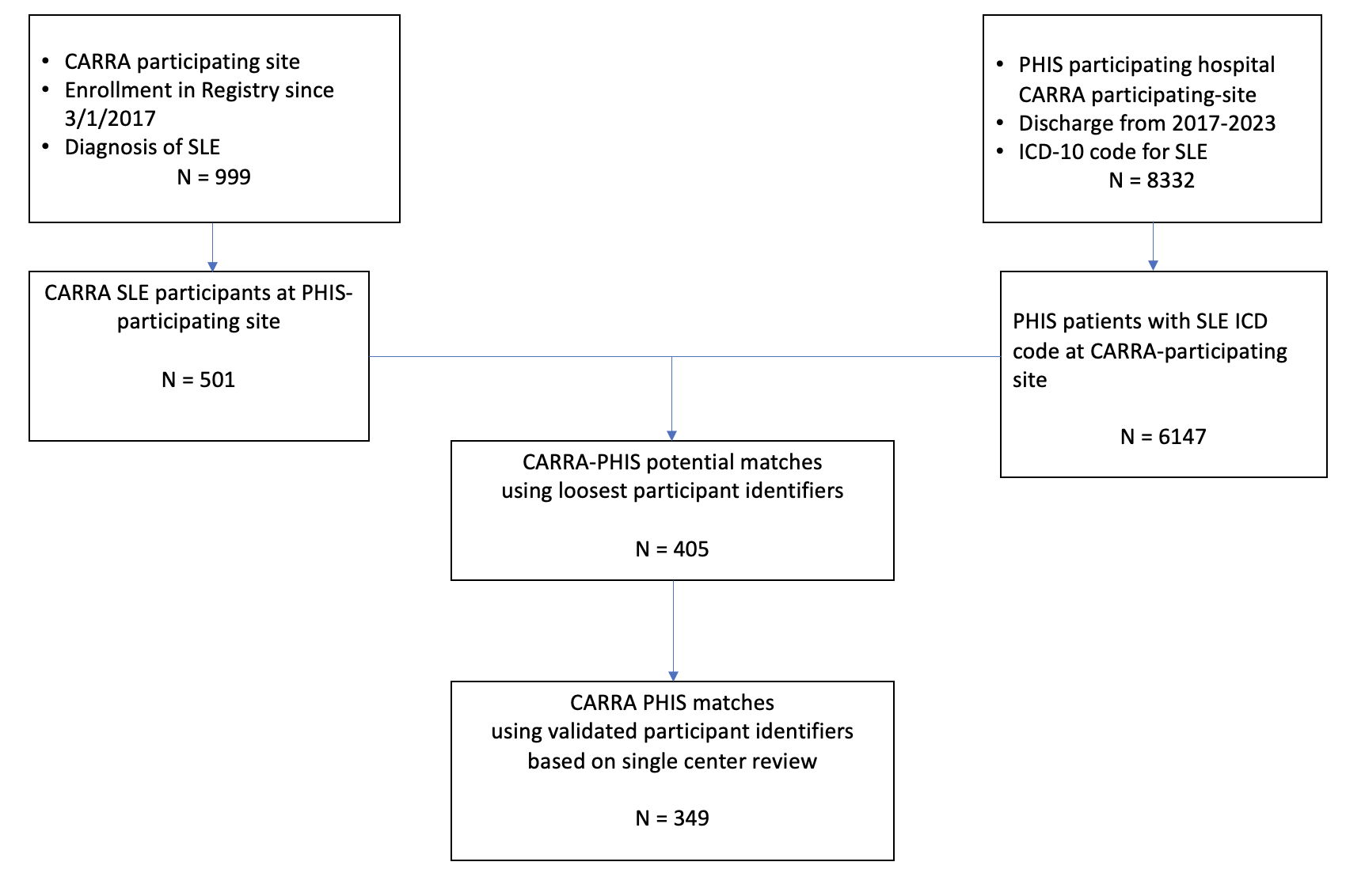Session Information
Session Type: Poster Session B
Session Time: 10:30AM-12:30PM
Background/Purpose: Currently, no comprehensive national multipayer dataset with inpatient and outpatient data exists for childhood rheumatologic diseases, limiting the ability to study outcomes longitudinally and to evaluate medication safety and effectiveness in children with rare diseases. We have previously studied childhood-onset systemic lupus erythematosus (cSLE) treatment and outcomes using the Childhood Arthritis and Rheumatology Research Alliance Registry (CARRA) (a prospectively collected longitudinal disease registry from >70 sites across North America) and separately using the Pediatric Health Information System (PHIS) (administrative database of >50 freestanding U.S. children’s hospitals). This study aimed to link the CARRA Registry with PHIS to create a novel, comprehensive cSLE dataset with a defined population that includes inpatient and outpatient clinical data.
Methods: The PHIS dataset from 2017-2023 was extracted and restricted to those with ³1 ICD-10 code for SLE. The CARRA Registry data from 2017-2023 was restricted to those with cSLE diagnosis, and subsequently, to those enrolled at a site participating in both CARRA and PHIS (CARRA-PHIS site). Limited patient identifiers were used to link records from CARRA Registry participants with 1 or more encounter in the PHIS cSLE dataset in a stepwise fashion, starting with a combination of site of care, 5-digit ZIP code, date of birth, and sex (Step A). Remaining unmatched patients were evaluated for matches based on progressively looser criteria (Steps B through E) as described in Table 1. Accuracy was determined by unblinding PHIS and CARRA identifiers for patients at Seattle Children’s Hospital (SCH) and validating using chart review. Linkage steps yielding inaccurate matches were discarded in the final linkage strategy.
Results: We identified 999 youth with cSLE in the CARRA Registry. This cohort was then limited to participants from the 36 sites which participate in CARRA and PHIS, yielding 501 eligible CARRA enrollees. Within these 36 sites, 6,147 unique youth with cSLE were identified in PHIS. The linkage algorithm yielded 405 potential matches (Table 2). All potential matches at Seattle Children’s Hospital identified using steps A and B were accurate, and all identified in subsequent steps with non-exact date of birth were inaccurate, though each potential match identified from PHIS had chart-confirmed lupus. Sequential use of steps A and B was selected as the optimal linkage algorithm for this cohort, yielding 349 matched participants.
Conclusion: We demonstrated that linkage of the CARRA Registry to PHIS using a deterministic algorithm to identify participants with cSLE is feasible and accurate. Next steps include testing the linkage algorithm across centers with variable enrollment rates in the CARRA Registry and assessing representiveness of the cSLE population in the Registry compared to all those with cSLE who are eligible for enrollment. This linked data source may allow for investigations of longitudinal clinical outcomes and medication safety and effectiveness in cSLE. Future directions of this work include applying the linkage strategy to other pediatric rheumatologic diseases.
To cite this abstract in AMA style:
Roberts J, Faino A, Chang M, Cogen J, Hall M, Morgan E. Linkage of the Childhood Arthritis and Rheumatology Research Alliance Registry with the Pediatric Health Information System: Creation of a Comprehensive Childhood-Onset Lupus Dataset [abstract]. Arthritis Rheumatol. 2024; 76 (suppl 9). https://acrabstracts.org/abstract/linkage-of-the-childhood-arthritis-and-rheumatology-research-alliance-registry-with-the-pediatric-health-information-system-creation-of-a-comprehensive-childhood-onset-lupus-dataset/. Accessed .« Back to ACR Convergence 2024
ACR Meeting Abstracts - https://acrabstracts.org/abstract/linkage-of-the-childhood-arthritis-and-rheumatology-research-alliance-registry-with-the-pediatric-health-information-system-creation-of-a-comprehensive-childhood-onset-lupus-dataset/



